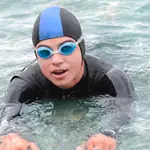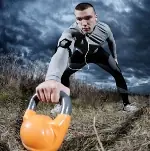
Q: Hi Gale, I'm going to do an open water swim this weekend and the predicted water temperature is in the 50s. The last time I tried to do a training swim in water that was in the 50s or 60s I had to bail as I could not get my face into the water. I could get my body into the water but each time I tried to put my face into the water, I was gasping for air and felt like I might suffocate. Know that I had all the gear: wetsuit, foot and head neoprene gear.
I am such a wimp in cold water—I hate to admit it. I know this cold water thing is mostly mental, but do you have any suggestions how I can overcome the problem?
A: What you're experiencing with putting your face in cold water is very common. In fact, it's not only mental, it's physical as well. The automatic reflex you are experiencing is called the mammalian diving reflex. It is a reflex that optimizes your respiration to allow you to stay underwater for long periods of time—should that be needed by choice, or necessary due to an accident.
More: Cold Weather Training and Your Body
As you've already noticed, the reflex does not occur when putting your body or limbs into cold (less than 70 degrees Fahrenheit) water; it's only your face. This is because the cold receptors are not in your body or limbs but in your nasal cavity and other facial areas that relay information to your brain. Once triggered by cold, the automatic nervous system then takes control to make changes in your body. This includes slowing your heart rate down and restricting blood flow to the limbs and organs to conserve oxygen for the heart and brain.
So, knowing that your body—along with everyone's body—will automatically respond to cold water by feeling a bit short of breath, and then automatically make adjustments, can help you to alleviate the worry and fear. This is the mental part of the process—knowing what to expect can reduce the level of fear.
More: 6 Ways to Train the Triathlon Swim Start
It may be too close to race day, but if you can get into the cold water a couple of times before the race and get your face into the water, it will help. I've found that triathletes and swimmers that can experience the changes the body makes when the face hits cold water, a few times before race day, do much better. They know what's coming, they know it will settle out, and they know they can swim once their bodies make the adjustments.
If it is too close to race day to do training swims, get into the water on race morning to get this feeling out of the way before the gun goes off. If it's too cold to get into the water before the race, just move yourself to the back or the side of your heat. When you get into the water, you can try breast stroking a few times to start the process. When you're ready, put your entire face in and just know that it will take a bit for your body to settle out and adjust.
More: How to Stay Warm at a Cold-Weather Race
Another person I coach has asthma, and cold water makes the short breath feelings worse. If the weather conditions are cold, along with the water conditions, I have her carry a thermos of hot tea to the race start to warm her from the inside out. She said this warmth from the inside seems to help a lot. Another fellow I coached used warm apple flavored sports drink. He said he felt much better as well.
So, you're no wimp for experiencing the shortness of breath. Perhaps knowing this feeling is common and that you can work your way through it will help. Let me know how it goes.
More: The Real Reason You Should Warm Up
 Search for your next triathlon.
Search for your next triathlon.
About the Author

Get ACTIVE on the Go


Couch to 5K®
The best way to get new runners off the couch and across the finish line of their first 5K.
Available for iOS | Android







Discuss This Article